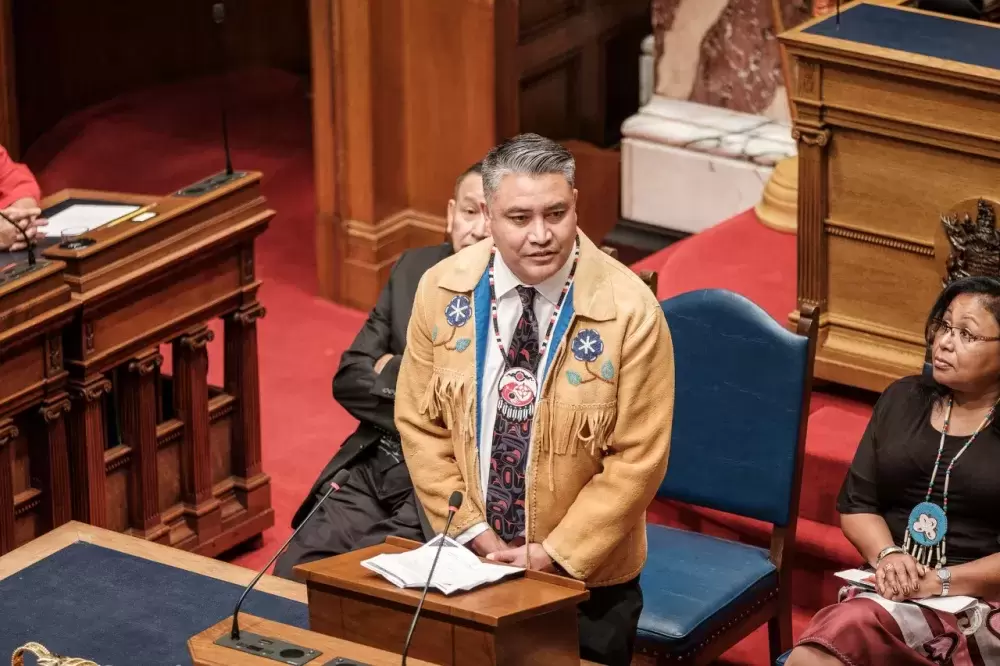British Columbia’s first annual report on the advancement of the Declaration on the Rights of Indigenous Peoples Act has been released, and will be presented in the legislature next week.
The Declaration on the Rights of Indigenous Peoples Act was developed in consultation with Indigenous peoples, including the First Nations Leadership Council, and was approved unanimously in the B.C. legislature on Nov. 28, 2019. British Columbia became the first province in Canada, and one of the first jurisdictions in the world, to pass the law.
The Act mandates B.C. to bring provincial laws into alignment with the UN Declaration and to develop an action plan to meet the objectives of the UN Declaration, with annual public reporting to monitor progress and ensure accountability.
The Act enables new decision-making agreements between B.C. and Indigenous governing bodies on matters that directly affect Indigenous peoples.
The annual report, that covers the first four months from when the act came into force, highlights many positive strategic initiatives like developing the BC First Nations Justice Strategy. Announced in March, the strategy includes improving cultural competency within the justice system, diverting First Nations people from the court system wherever possible, establishing roles for elders and knowledge-keepers and a systemic approach to implementing the Gladue decision.
The report also emphasizes changes to child welfare laws to keep Indigenous children with their families and communities, updates to the province’s K-12 curriculum to include Indigenous culture and history in all grades, as well as Indigenous language revitalization.
Terry Teegee, regional chief of the British Columbia Assembly of First Nations, said with this being the first annual report, it’s still a work in progress and there’s commitments that haven’t been looked at yet.
“Something that has been emerging over this time, during this pandemic, is the health act because of what we’re seeing and I’m sure that’s going to be a priority to many chiefs,” Teegee said. “The police act will probably be another initiative where we need to implement the declaration. Some of these things were already a work in progress but a really important part for the next report would be seeking direction on the action plan.”
An action plan is required under the act and will include prioritized, tangible activities to implement the objectives of the UN Declaration, according to the province of B.C. It is expected to be complete before the end of the year. The action plan will be informed by continued engagement with Indigenous peoples, as well as existing and previous consultations and agreements.
Not included in the annual report was mention of one of the biggest news stories during the beginning of the year—protests sparked by the Wet'suwet'en Nation hereditary chiefs’ opposition to the construction of the Coastal GasLink natural gas pipeline through their territory in northwestern British Columbia.
A Memorandum of understanding between Wet’suwet’en chiefs, Ottawa and the province was signed on May 14 by nine hereditary chiefs, Canada’s Minister of Crown-Indigenous Relations Carolyn Bennett and Scott Fraser, B.C.’s minister Indigenous Relations and Reconciliation. The MOU declares that the Wet’suwet’en have “a legal interest in land” on their territory, with a list of areas in which authority will be transferred over to the hereditary chiefs.
The annual report covers a period of time before the MOU was signed, which explains why it wasn’t mentioned in the report.
Teegee said he believes the Wet’suwet’en protests weren’t mentioned in the annual report because the conflict is being managed at a federal level.
“I think from the province’s side, Wet’suwet’en really took this up on more of a government-to- government relationship in terms of the Wet’suwet’en and the federal government,” Teegee said. “I think even though Minister (Scott) Fraser was brought in to some of those discussions, and many other groups, it was more of a government to government between the Wet’suwet’en and federal government.”
Minister Scott Fraser said the Wet’suwet’en conflict is still a very important issue in the province but that it’s “just not reflected in the act in any way.”
“It’s kind of a weird annual report because it’s really only reflective of the first few months since the legislation was brought in, and of course the majority of that time we’ve been in a state of pandemic,” Fraser said. “That being said, we’re still continuing the work. We’re developing the action plan.”
Fraser said the action plan, through collaboration and partnership with First Nations, will chart the province’s path forward and help determine what legislation needs to be prioritized or amended.
“We knew we were heading in this direction when we got elected, we had made the commitment that we were going to bring forward legislation and develop that in partnership with First Nations,” Fraser said. “Knowing that that was going to be what guides us, we started bringing in a whole bunch of different initiatives across government.”







